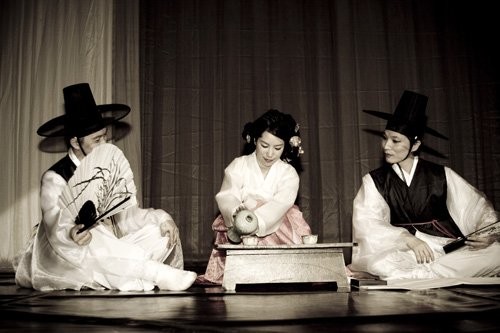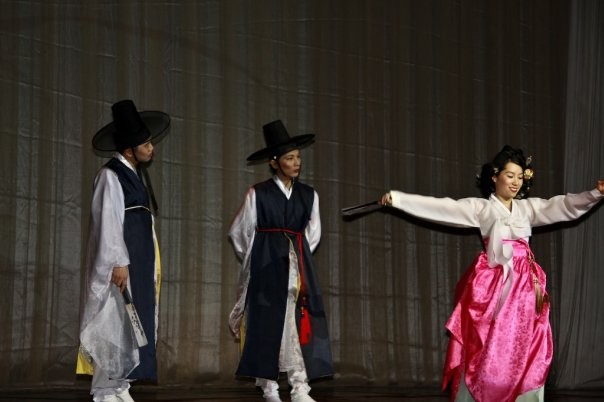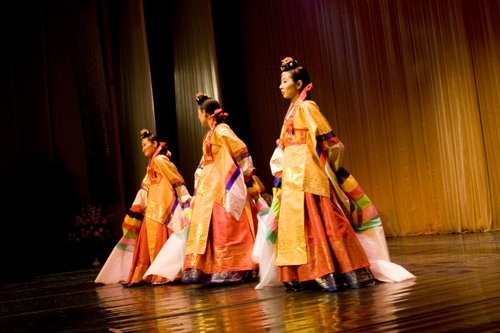The social function of Korean traditional dance in the culture of Korean Diaspora-
Focusing on
Hebrew introduction:
הקדמה:
יאנג מין-אה היא דוקטורנטית במחלקה לאנתרופולוגיה בתחום התרבות ולימודים אתניים באוניברסיטת סנט פטרסבורג, רוסיה.
מין-אה מתגוררת בשנים האחרונות בסנט פטרסבורג ולפני שלש שנים הקימה להקה מחול קוריאני-מסורתי ובו לוקחות חלק צעירות ממוצא קוריאני, מצאצאי אוכלוסיית המהגרים הקוריאנים שאבותיהם היגרו לרוסיה במחצית המאה ה-19. אוכלוסיה זו משמרת מספר מסורות מהתרבות הקוריאנית בעיקר בגינוני חלק מהחגים, במסורות אוכל וקודים התנהגותיים- תרבותיים, אך אינם דוברי קוריאנית מאז נאסר על אוכלוסיות מהגרים כמותם לשמר את שפת מוצאם בתקופתו של סטאלין.
הסיבות להגירה היו בעיקרן כלכליות, אם כי לא רק. בתחילת המאה ה-19 קבוצה קטנה של העילית החברתית החזיקה את מרבית ההון ואמצעי הייצור. רבים מבני מעמד הפועלים התקשו לקיים את משפחתם והעוני פשט. בפני מי שביקש להגר לא נותרו חלופות, אלא הגירה לכיוון סיביר ולמחוזות המזרחיים הסמוכים הקרובים לצפון קוריאה. הגבול הדרומי הגובל בסין היה סגור לחלוטין בפני מהגרים על ידי שליטי שושלת צ'ינג.
ההגירה שהחלה ב- 1863 עם קבוצה קטנה של משפחות התגברה ושש שנים אחר כך כבר מנו כ-20% מהאוכלוסיה במחוזות אלה ובשלהי המאה כבר מנו יותר מ-300,000 איש רק במחוזות המזרח הרחוק ברוסיה.
השלמת קו הרכבת הטראנס סיבירית הביאה להגירה לפנים המדינה.
אחרי מהפיכת אוקטובר הלאים השלטון חוות חקלאיות של אזרחים ממוצא קוריאני. בסוף שנות השלושים של המאה העשרים ערך סטאלין 'טיהור' של מנהיגי הקהילה במקביל ל'טראנספר' של אוכלוסיה ממוצא קוריאני למדינות מרכז אסיה ובהם אוזבקיסטן וקזחסטאן בתואנה שהם מהווים סכנה, ועלולים לרגל לטובת יפן. במשך כשני עשורים היו הם מנועים מלצאת את גבולות מושבם.
הרדיפות מחד והיזמות הטבועה באוכלוסיה החרוצה הזו הביאו דווקא להידוק הלכידות החברתית ביניהם ושימור מרכיבי זהות ייחודיים. מאחר ודיבור והקניית השפה הקוריאנית היו אסורים המשך עשורים רבים, איבד חברי הקהילה את שפת האם.
יאנג מין- הא חוקרת את הקהילה בסנט פטרסבורג ומקווה להעשיר את התרבות הקוריאנית בקרב הקהילה, לחזק את דימויה העצמי פנימה ואת תדמיתה- כלפי חוץ.
The social function of Korean traditional dance in the culture of Korean Diaspora
– Focusing on
Yang, Min Ah*
 This paper investigates the social function of Korean traditional dance in the culture of Korean Diaspora in
This paper investigates the social function of Korean traditional dance in the culture of Korean Diaspora in
The word ‘Diaspora’ means a steady set of people of the uniform ethnic origin, living in foreign environmental outside of the historical native land (or an outside area of moving people) and having social institutes for development and functioning of the given generality.
Russian Koreans started to immigrate to The Russia Empire’s territory (The Maritime
In such a way, the early Korean Diaspora was made up. They founded their schools, societies and theater. They could live to preserve their language, culture and tradition before the deportation. In 1937, Stalin’s Government accused Koreans of being Japanese spies and they were exiled to the
According to Korean national character, Russian-Koreans were well-adapted to new Russian society and they feel very strong zeal for the education of their children. They were Russian educated and live as a Russian intelligentsia citizens. Korean’s typical advantageous traits were tolerance, diligence and kindness. These elements helped a degree of assimilation, or getting along smoothly with the Russian society .
According to the official statistics, 148,000 Russian-Koreans lived in
National dance is a component of a spiritual life of its ethos. Indeed, live national dance existed for the sake of dancing performers; it was collectively created and reproduced. At the same time it was an individual expression of experiences. Its time is simultaneously infinite, and close, historically .
The Korean dance was being enriched by philosophical doctrines and religious beliefs. Its elements are connected with Shamanism, Confucianism, Daoism and Buddhism. There is no contradiction between these elements, as for example with western culture, and they are in harmonious unity, enriching and supplementing each other. As, the Korean dance the nature, moderation etc. Process of mastering the Korean dance includes not only techniques training, but also education of the mature person and his spirituality bringing the person internal harmony, calmness, tolerance and obedience of the law.
 The purpose of this paper is to follow the revival process of Korean culture by the Korean Diasporas as an ancestor's culture and theirs through the education of Korean traditional dance.
The purpose of this paper is to follow the revival process of Korean culture by the Korean Diasporas as an ancestor's culture and theirs through the education of Korean traditional dance.
The significant role in actualization of interest of the Russian citizens in the Korean traditional culture is played with the St.-Petersburg Korean youth cultural-educational center which has been created in 1995.
The primary goal of the Korean center consists of presenting Korean culture in
The author worked as a teacher of the Korean traditional dance and as an artistic director in the Korean traditional dance company "Soun" for 3 years. At the same time, had opportunities, to observe the increase of interests of the Russian-Koreans in their culture, in particular, in the Korean traditional dance, both among , among Russian-Koreans in
Process of development of new culture, from our point of view, allows forming the new, tolerant attitude to other cultures and people as a whole. It is especially important to study this process in St.-Petersburg – city historically poly-cultural and multinational where relationships between various ethno-cultural groups had and have constructive character. Studying specificity of inter-cultural interaction in the environment of Russian-Koreans in
 According to the ethnic and cultural characteristics, The Russian Federation is unique. From the point of view of a foreigner, the
According to the ethnic and cultural characteristics, The Russian Federation is unique. From the point of view of a foreigner, the
Now, The Russian society requires stability. Showing special care in dealing with ethnic minorities, the Russian Government creates conditions that enable new inter-ethnic cultural dialogue which is considered as an important tool in the struggle against intolerance and xenophobia. The solution of this problem represents one of the main topics which the state national policy deals with. Experience of
————-
* Yang, Mina Ah is completing her PHD degree at Saint Petersburg State University, in department of Cultural Anthropology and Ethnic Studies. O.B
[ad]